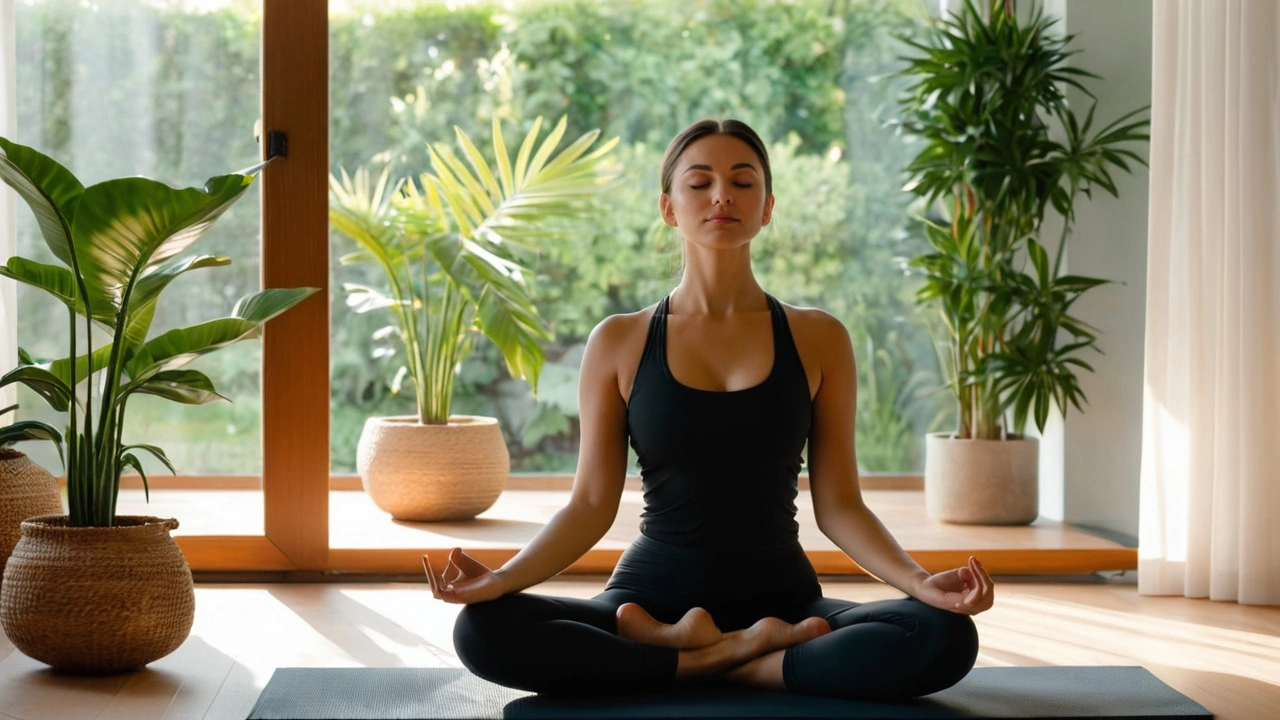Meditation is no longer just a spiritual practice reserved for monks and gurus. Today, people from all walks of life are recognizing its benefits, especially when practiced in the morning. This early day ritual sets a calming tone, helping to manage the stresses that come with busy schedules.
The science is clear: meditation can help reduce anxiety, improve concentration, and enhance overall mental well-being. It's like giving your mind a refreshing shower, cleansing away any clutter from the previous day.
But the advantages don't stop there. Studies have shown that consistent meditation can lower blood pressure, improve sleep quality, and even boost your immune system. Imagine starting each day with both your mind and body aligned and ready to tackle the day ahead.
If you're new to meditation, don't fret. It's not about achieving perfection but about finding moments of peace. Start with just five minutes in a quiet place, focusing on your breath. Over time, you'll notice a shift in your mindset and energy levels.
Integrating meditation into your morning routine isn't as daunting as it seems. With a bit of consistency, this simple practice can transform your mornings and, by extension, your life. So why not give it a try?
- The Science Behind Morning Meditation
- Mental Health Benefits
- Physical Health Benefits
- Simple Meditation Tips for Beginners
- Incorporating Meditation into Your Routine
The Science Behind Morning Meditation
Meditation is often associated with spiritual enlightenment, but modern science has delved deep into the practice, uncovering a myriad of benefits that are rooted in neuroscience and physiology. When we meditate, especially in the quiet of the morning, our brains can enter a state of deep relaxation, which can significantly impact our overall well-being.
One of the most profound effects of meditation is its ability to alter brainwave patterns. During meditation, the brain transitions from beta waves, which are associated with active thinking and problem-solving, to alpha waves, which signify relaxation and reduced mental effort. This shift not only calms the mind but also prepares it for a more focused and productive day ahead.
Studies utilizing functional MRI scans have revealed that regular meditation can increase the density of grey matter in the brain. Grey matter is crucial for processing information and making decisions. As little as eight weeks of mindfulness meditation can make tangible changes in the brain's regions linked to memory, sense of self, empathy, and stress. With consistent practice, these changes can enhance mental clarity, emotional stability, and even creativity.
In addition to cognitive enhancements, meditation has been shown to reduce levels of cortisol, the primary stress hormone. Elevated cortisol can lead to a host of health problems, such as high blood pressure, sleep disturbances, and weakened immune function. By practicing meditation every morning, you can significantly lower cortisol levels, promoting a healthier and more resilient body.
The benefits are not limited to the brain and hormones. Heart rate variability (HRV), a measure of the variation in time between each heartbeat, is also positively impacted by meditation. Higher HRV is a sign of a healthy and adaptable cardiovascular system. People who meditate regularly often experience improved HRV, indicating better heart health and reduced risk of heart disease.
Moreover, meditation in the early hours can set a positive tone for the rest of the day. It enhances mindfulness, allowing individuals to be more present and engaged in their activities. This level of awareness can translate to improved interpersonal relationships, as you'll be more attuned to the emotions and needs of others.
Dr. Sara Lazar, a neuroscientist at Harvard Medical School, states, "The practice of meditation can alter the structure of the brain in ways that support more resilient, adaptive behaviors. It's a powerful tool for personal transformation."
Another fascinating aspect of morning meditation is its role in enhancing neuroplasticity—the brain's ability to reorganize and form new neural connections throughout life. This adaptability is crucial for learning new skills, recovering from injuries, and maintaining cognitive function as we age. Regular meditation strengthens these adaptive processes, making the brain more flexible and capable of handling various challenges.
Incorporating meditation into your morning routine is like giving your brain a fresh start every day. It's a simple yet effective practice that can bring profound changes to your mental and physical health. With just a few minutes each morning, you can harness the power of meditation to cultivate a more balanced, focused, and fulfilling life.
Mental Health Benefits
Meditation has long been recognized for its ability to enhance mental well-being. This practice works to create a serene environment within our minds, helping to reduce anxiety levels and promote a sense of inner peace. Recent studies back this up, showing that regular meditation can significantly lower levels of the stress hormone cortisol, which is often linked to anxiety and depression.
One of the most notable mental health benefits of meditation is its impact on stress reduction. By focusing on the present moment and letting go of external concerns, many people find that their stress levels drop substantially. This isn't just anecdotal. A study published in JAMA Internal Medicine found that meditation programs can result in small to moderate reductions in psychological stress.
Moreover, meditation provides a boost to emotional health. By regularly dedicating time to this practice, individuals often report increased self-awareness and a more positive outlook on life. This shift in mindset can result in a more optimistic approach to daily challenges, combating negative thoughts and fostering resilience.
In addition to reducing stress, meditation can also improve focus and concentration. Regular practice may increase the amount of grey matter in the brain, as noted in a study by Harvard researchers. This grey matter is associated with memory and learning, meaning that meditation can help enhance cognitive functions. This can be particularly beneficial for those with demanding jobs or busy lives.
“Meditation is not evasion; it is a serene encounter with reality.” - Thich Nhat Hanh
Another key benefit is improved self-awareness. When meditating, you learn to observe your thoughts without judgment. This can lead to a better understanding of your thought patterns, helping you identify and address negative behaviors or attitudes. It's a journey towards self-discovery, one that promotes a healthier relationship with oneself.
Finally, it's worth mentioning the potential benefits for those dealing with mental health disorders such as depression. While meditation is not a cure, it can be an effective complementary therapy. Research indicates that mindfulness-based cognitive therapy (MBCT), which combines mindfulness meditation with cognitive behavioral techniques, can help prevent relapse in people who have recovered from depression.
In short, integrating meditation into your morning routine can offer extensive mental health benefits. By reducing stress, enhancing focus, and promoting emotional well-being, it acts as a robust tool for maintaining mental health. The beauty of meditation is that it is accessible to all, making it an inclusive practice that can be adapted to fit the needs of each individual.

Physical Health Benefits
When people think of meditation, they often focus on its mental benefits, but there are significant physical health benefits that shouldn't be overlooked. Meditation has been shown to lower blood pressure, which can reduce the risk of heart disease and strokes. This is achieved by helping the body enter a state of deep relaxation, reducing the strain on blood vessels and the heart.
According to a study published in the American Journal of Hypertension, participants who practiced meditation for a few months experienced a noticeable drop in their blood pressure levels. By routinely entering a state of calm, meditation encourages the production of nitric oxide, which opens up blood vessels and reduces blood pressure.
Meditation can also enhance your immune system. Stress weakens the immune response, making you more susceptible to infections and illnesses. By managing stress through meditation, you can bolster your body's defenses. A study conducted by researchers at the University of Wisconsin-Madison found that participants who meditated experienced an increase in the presence of antibodies after receiving a flu vaccine compared to those who did not meditate.
"Meditation is a simple practice available to all, which can reduce stress and increase calmness and clarity," says David S. Black, Ph.D., from the University of Southern California. "With regular practice, you can literally shape your brain to make you physically healthier."
Aside from improving heart health and immunity, meditation can also lead to better sleep quality. Sleep is crucial for the body's recovery and repair processes. When you meditate, you activate the parasympathetic nervous system, which helps to calm the mind and relax the body, making it easier to fall and stay asleep. This is particularly beneficial for those who suffer from insomnia or other sleep disorders.
If weight management is a concern, meditation can aid in this aspect too. Chronic stress often leads to emotional eating and unhealthy food choices. Meditation helps regulate stress-related hormones, such as cortisol, reducing the likelihood of stress-induced overeating. It's not uncommon for those who meditate regularly to report better control over their eating habits and weight.
Lastly, meditation can also enhance physical performance. Athletes and fitness enthusiasts can benefit from the increased focus and mental clarity that meditation provides. This heightened state of awareness can lead to more efficient training sessions and quicker recovery times. Professional sports teams often incorporate meditation and mindfulness into their training regimen for this reason.
Incorporating meditation into your morning routine offers a range of physical health benefits. From reducing blood pressure to boosting your immune system, aiding better sleep, assisting in weight management, and enhancing physical performance, the advantages are both profound and manifold. As you make meditation a regular part of your life, you'll likely start to notice these cumulative effects on your overall physical health.
Simple Meditation Tips for Beginners
Starting a meditation practice might seem intimidating, especially if you're new to it. The good news is, it doesn't require much to get started, and the benefits are well worth the effort. The first step is finding a quiet space where you won't be interrupted. This could be a cozy corner of your home or a serene spot in your garden. The goal is to create a small sanctuary where you feel comfortable and focused.
Once you have your space, you can begin by sitting in a comfortable position. There's no need to twist yourself into a pretzel; sitting on a chair with your feet flat on the floor works just fine. Gently close your eyes and take a few deep breaths. Inhale through your nose and exhale through your mouth. This simple act of mindful breathing starts to relax your mind and body.
Next, try to focus on your breath. Notice the sensation of the air entering and leaving your nostrils. If your mind starts to wander – and it will – gently bring your attention back to your breath without any judgment. This process of returning to your breath trains your mind to stay present.
“You should sit in meditation for twenty minutes a day, unless you’re too busy,” says an old Zen saying, “then you should sit for an hour.”
Another helpful tip for beginners is to use guided meditations. These are available through various apps and websites, giving you a structure to follow. A calm voice typically guides you through the process, making it easier to maintain focus. Some popular apps include Headspace, Calm, and Insight Timer.
Consistency is key when it comes to meditation. Even if you start with just five minutes a day, it's important to do it every day. This consistent practice helps to build the habit, making meditation a natural part of your morning routine. As you become more comfortable, you can gradually increase the time you spend meditating.
It’s also beneficial to experiment with different types of meditation to see what resonates with you. Mindfulness meditation, loving-kindness meditation, and body scan meditations are all good starting points. Each type offers unique benefits and may appeal to you in different ways.
Remember, meditation is a personal journey. There's no right or wrong way to do it. The key is to find what works for you and stick with it. Even if you have a day where your mind feels especially chaotic, that's okay. The important part is that you're showing up for yourself and making the effort.
If you’re looking for extra motivation, consider joining a meditation group or finding a meditation buddy. Sharing the experience with others can provide support and accountability. Plus, it can be encouraging to hear about other people's journeys and the challenges they overcome.
Lastly, be patient with yourself. Progress in meditation might be slow and subtle, but over time you’ll begin to notice changes in your mood, stress levels, and overall well-being. It's a journey worth embarking on, and with these simple tips, you're well on your way to making meditation a rewarding part of your morning routine.

Incorporating Meditation into Your Routine
Starting your day with meditation might seem like a challenge, especially if you're not accustomed to it. But with a bit of dedication and the right approach, it can become as natural as brushing your teeth. The good news is you don’t need to meditate for hours to experience the benefits. Even five to ten minutes each morning can set a positive tone for the rest of the day.
To begin with, find a quiet space where you won't be disturbed. It could be a cozy corner of your bedroom, a balcony with a view, or even your living room before everyone else wakes up. The key is to make this space inviting and calming, a place where you look forward to spending a few peaceful moments.
Once you have your spot, decide on a specific time each morning for your meditation. Many people find that meditating right after waking up works best, as it helps clear the mind and sets a peaceful tone for the day. If mornings are too hectic, try meditating after your morning shower or breakfast. The important thing is to stay consistent. Our bodies and minds thrive on routines.
“Meditation is not a way of making your mind quiet. It is a way of entering into the quiet that is already there - buried under the 50,000 thoughts the average person thinks every day.” – Deepak Chopra
Next, choose a meditation technique that works for you. Beginners might find guided meditations helpful. These are available through various apps, like Headspace or Calm, which offer sessions that walk you through the process. Alternatively, you can focus on your breath, counting each inhale and exhale, or use a mantra – a word or phrase that you repeat in your mind to build concentration. Don't worry if your mind wanders. It's natural. Just gently bring your focus back to your breath or mantra.
If you have particular goals in mind – like reducing stress or improving focus – you can tailor your meditation practice accordingly. For stress relief, try visualization techniques where you imagine a peaceful scene or a place where you feel happy and calm. To boost focus, consider mindfulness meditation, which involves paying attention to the present moment without judgment.
Incorporating meditation into your routine also means creating a ritual around it. Light a candle, play soft music, or burn some incense if it helps you relax. The sensory cues can signal your brain that it’s time to unwind and meditate. Over time, these little rituals can make a big difference in how easily you slip into a meditative state.
It’s also helpful to track your progress. Keep a journal where you note down how you feel before and after your meditation sessions. This can help you stay motivated and notice patterns or changes in your mood and stress levels over time. You might be surprised at how quickly the benefits start to appear.
Finally, don't be too hard on yourself. Like any new habit, meditating regularly takes time and patience. There will be days when your mind feels too restless or you run out of time. That's okay. What matters is getting back on track and making meditation a non-negotiable part of your morning routine.
Incorporating meditation into your morning routine can transform not just your mornings, but your entire day. With consistency and the right approach, you can enjoy a calm, focused, and happier life.







